Treble’s Top 100 Metal Albums
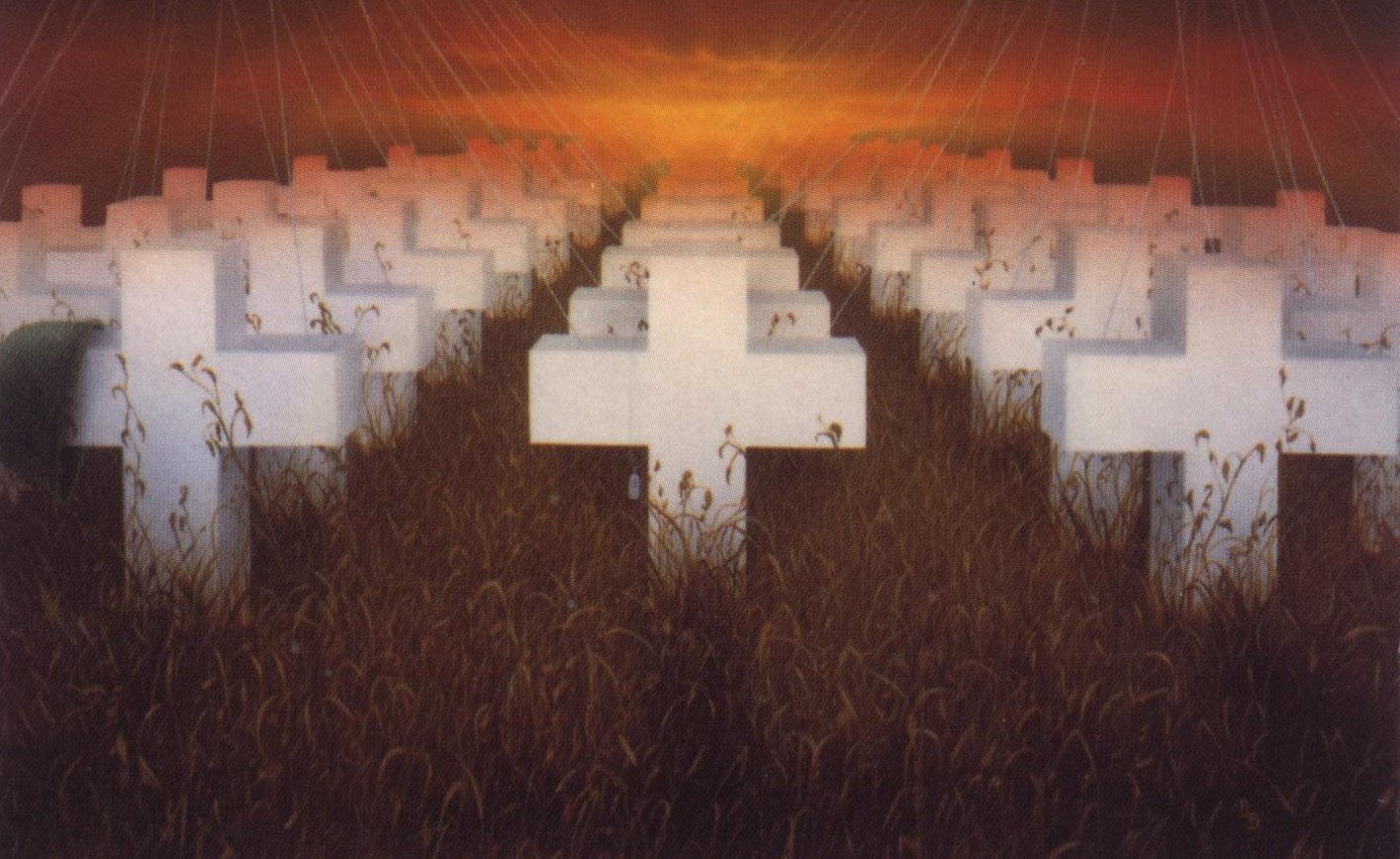
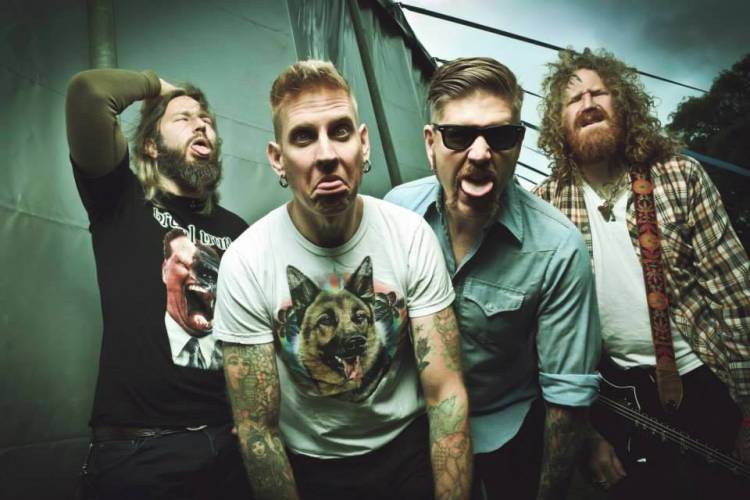 10. Mastodon – Leviathan
10. Mastodon – Leviathan
(2004; Relapse)
Simply put, Mastodon is the definitive Southern sludge band and Leviathan is the creme de la creme of Mastodon records. Having gotten more than enough practice letting out nasty, ear-dominating numbers on 2002’s Remission, the band had reached the perfect combination of preparation and ambition on their sophomore release. Their first attempt at a full-blown concept album, there’s very little that Mastodon didn’t get perfect on Leviathan. They sounded hungry, furious, and focused; their muddy prog-metal was filtered through a slight but noticeable increase in recording quality, and it was all the better for it. Leviathan is propelled by concentrated precision and grit; an epic tale based loosely on Herman Melville’s Moby Dick. But the true beast here isn’t the whale. By forcing their chaotic sound to merge seamlessly with more classical metal structures, Mastodon create a heavy metal environment as focused on the future as it is grounded in the genre’s past. And that’s the true beauty of the album: A song like “Seabeast” feels as familiar as it does alarmingly otherworldly. Ten years have passed since this titan was released into the wild, and it can (and has) been argued that Mastodon have slowly but surely headed away from metal and into the territory of sludge-inspired hard rock. But who can blame them? When your second album is as ground-breaking and earth-shattering as Leviathan, there’s only so much farther you can travel in the same direction. – A.T. Bossenger
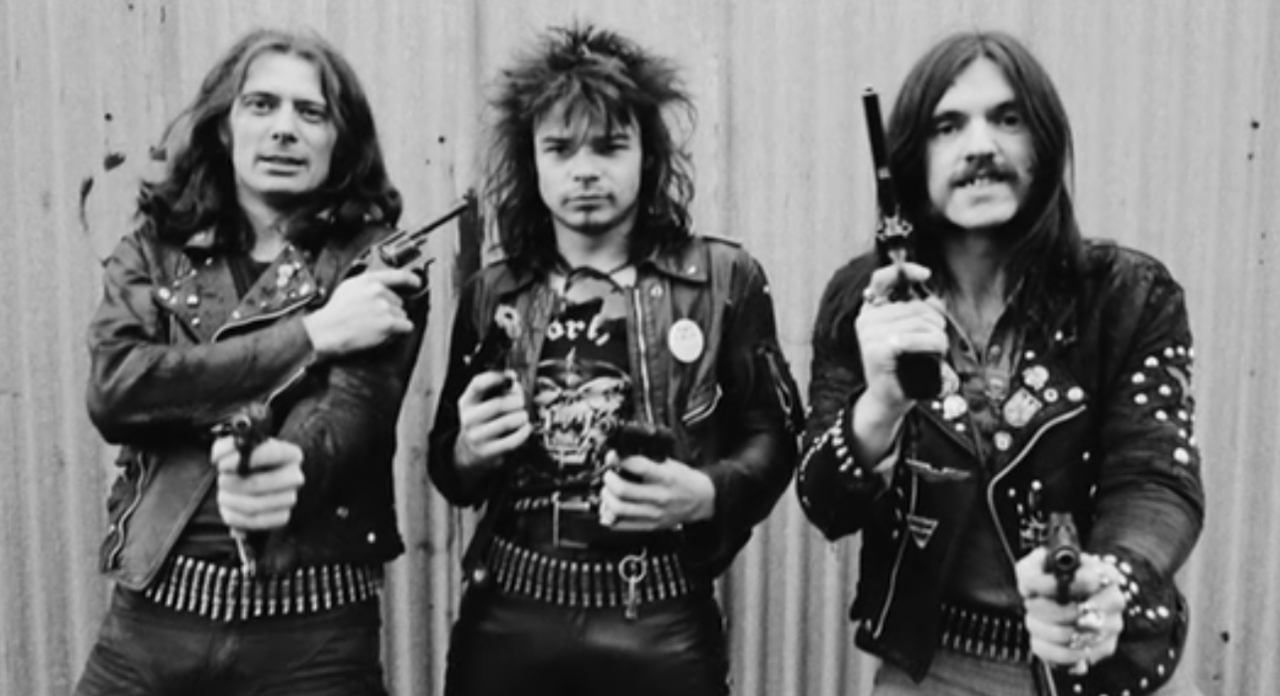 9. Motörhead – Ace of Spades
9. Motörhead – Ace of Spades
(1980; Bronze)
Not many albums kick more ass than Motörhead’s Ace of Spades. Songs like “Fire Fire” and “The Hammer” with all their blistering speed, solos, and grit are just two of many examples proving why this album is more than classic rock ‘n roll — it’s bruising and glorious heavy metal. Bridging the gap between punk and metal, Lemmy’s energy and indifference still makes him one of the greatest rock stars of all time. On the title track and one of the greatest songs in metal’s history, Lemmy’s welcoming and raspy call to arms to join him in all his reckless debauchery still packs a punch thirty-four years later: “You know I’m born to lose, and gambling’s for fools/ But that’s the way I like it baby, I don’t wanna live forever!” Scrappy and coarse, Motörhead’s magnum opus solidified them as pioneers in speed metal. – Dan Pritchett
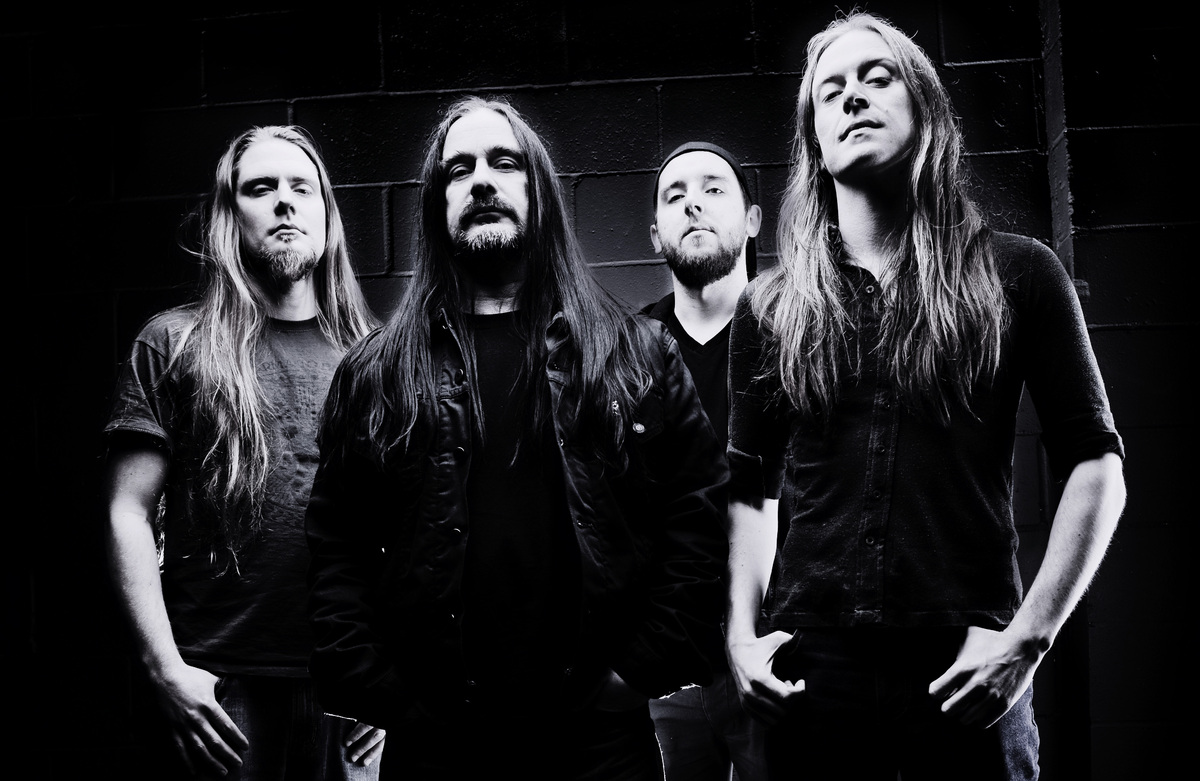 8. Carcass – Heartwork
8. Carcass – Heartwork
(1993; Earache)
Carcass’ career arc is one of the most notable examples in metal of artistic progression done right. In the beginning, the UK-based foursome pursued pummeling grindcore with gut-ripping gore via albums like Reek of Putrefaction and Symphonies of Sickness, before perfecting death metal with Necroticism — Descanting the Insalubrious, eventually having some fun with death ‘n’ roll on (at the time) final release Swan Song, and ultimately making a triumphant comeback via the melodic and brutal recent highlight, Surgical Steel. But at no point did the band ever sound quite so unstoppable as they did on their melodic death metal masterpiece Heartwork. Vocalist Jeff Walker is like a misanthropic carnival barker, his harsh vocals guiding the band’s proceedings as they progress through one riff-driven rollercoaster after another. And it’s really in the riffs where the band shows where their true strengths lie. Michael Amott and Bill Steer are the real stars of Heartwork, letting one harmonized sequence of flashy fretwork bleed into a sequence of guttural chugs on “Arbeit Macht Fleisch,” clicking with start-stop precision on “Doctrinal Expletives,” and grooving the fuck out on “No Love Lost.” There’s not a moment wasted on Heartwork, nor one that ever stops being an absolute thrill to listen to. Never before or since has death metal sounded simultaneously so artful and accessible. – Jeff Terich
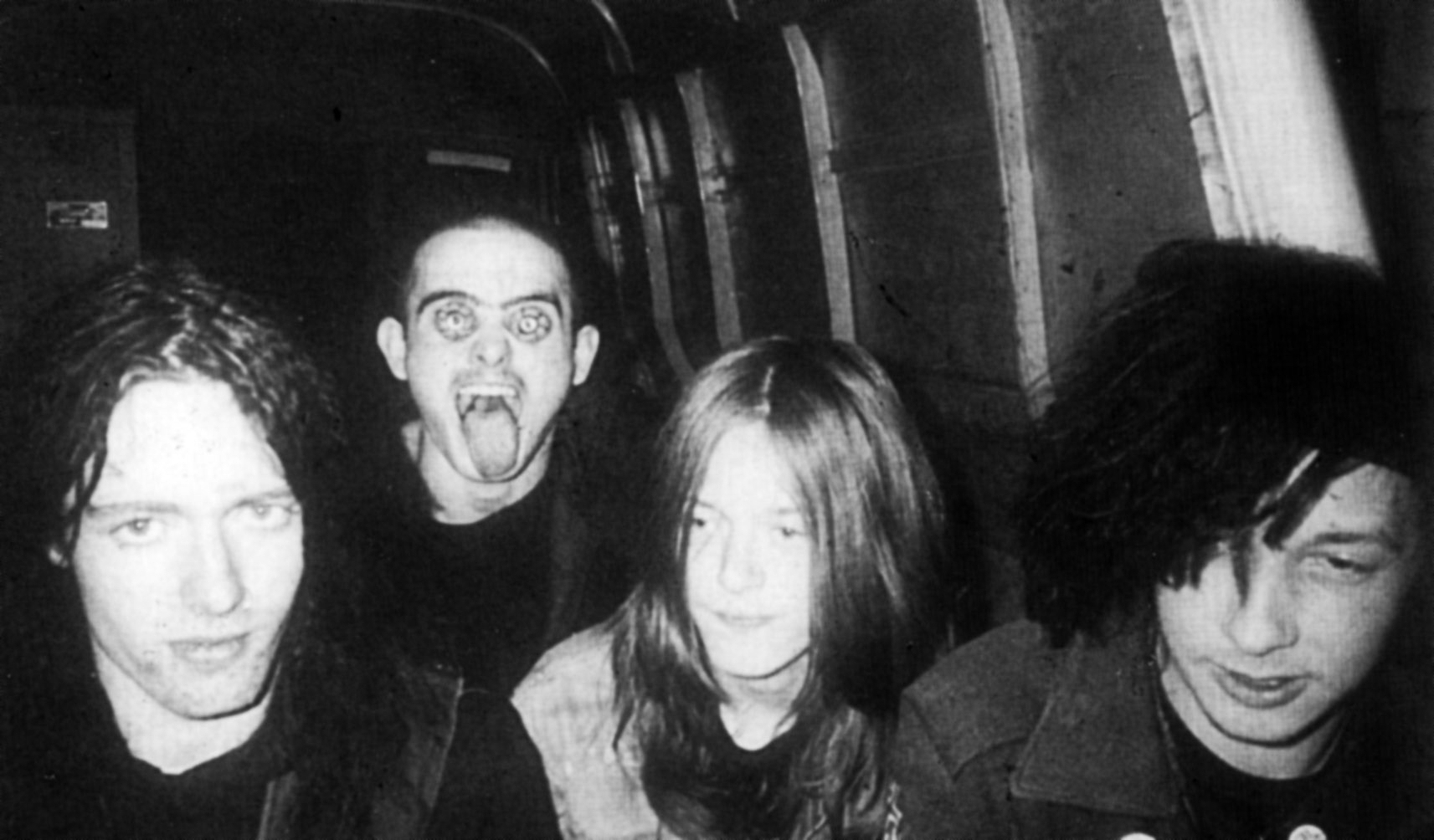 7. Napalm Death – Scum
7. Napalm Death – Scum
(1987; Earache)
There are grind-ier grindcore albums. There are ones with more extreme politics, and ones with more stylized growls. And there are definitely ones that sound more cohesive, where the band on the first half of the LP isn’t almost entirely different from the band on the second half (save for one indefatigably brutal drummer). But in all of its cheaply-recorded glory, Scum has no peer. It’s like the subgenre’s own Sgt. Pepper’s, with the famous cool people on the Beatles’ album cover replaced here by desiccated skulls, corporate logos and zombie suits looming over a family of starving Africans. Twenty-seven years after its release, what strikes me most about Scum is just how liberating it is. What misfit hasn’t wanted to push things to absurd extremes—to revel in the most rudimentary riffs and stubborn blast-beats, in the shortest amount of time possible? Napalm Death shows just how far you can take it, and in the process it only takes them 1.316 seconds to raise an age-old existential question about the sickness of our world: “YOU SUFFER, BUT WHY?!?!?!” —Peter Holslin
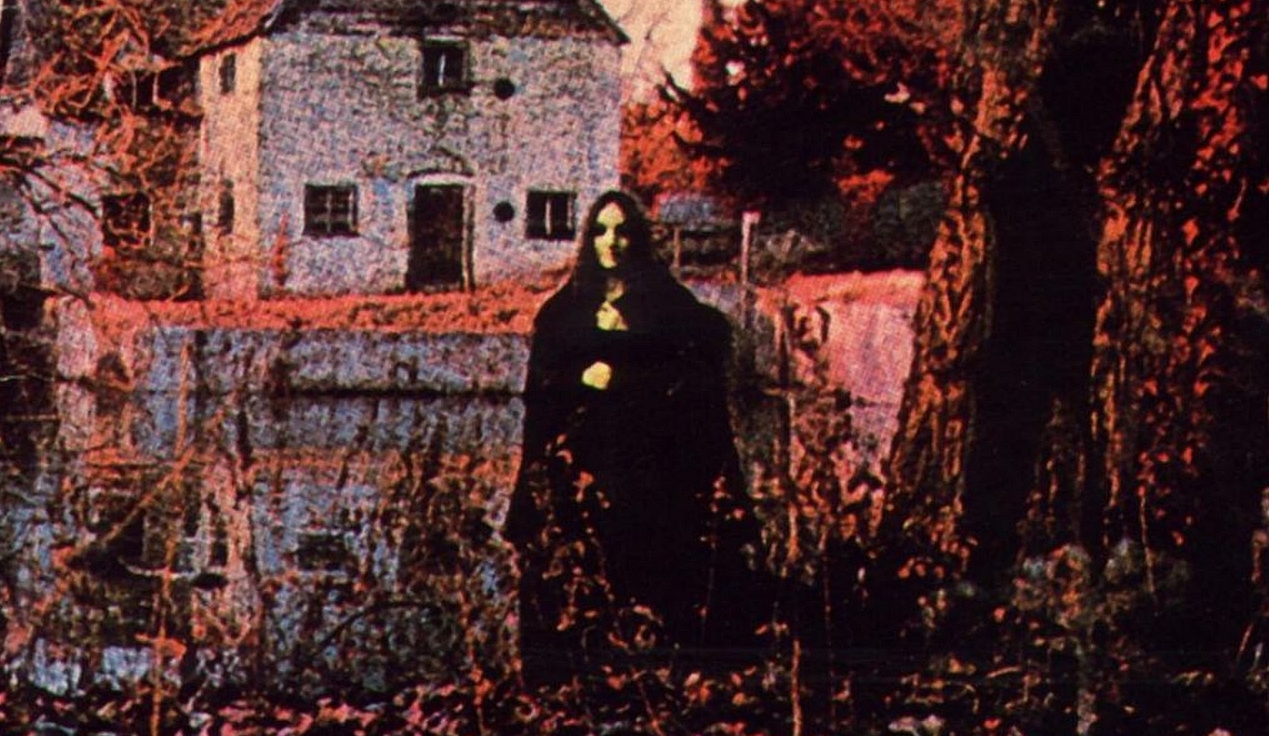 6. Black Sabbath – Black Sabbath
6. Black Sabbath – Black Sabbath
(1970; Vertigo)
If you were to trace metal, as Sepultura suggests, down to its “bloody roots,” this record is what you’d find at the bottom. Released in 1970 – the year that “ABC” by the Jackson 5 topped the charts, for reference – Black Sabbath’s self-titled debut harnessed the bluesy psychedelia and extreme volume of acts such as Led Zeppelin and Blue Cheer but reinterpreted it into something slower, more bleak, and utterly new (the opener “Black Sabbath” proves this right away, with its distorted, not-quite-blues riffing). However, the essential characteristic that defines this album is its palpable tone of doom and intensity, perfectly realized in Ozzy’s stripped-down vocals howling the demented blues and Tommy Iommi’s sludgy, downtuned guitar playing — all presented upfront, stentorian, and boiling over with tension. As a result, Black Sabbath, though not the best record Sabbath ever released, stands today as a pivotal moment in popular music history (the effective invention of metal music) and the foundation of the metal genre. – Connor Brown
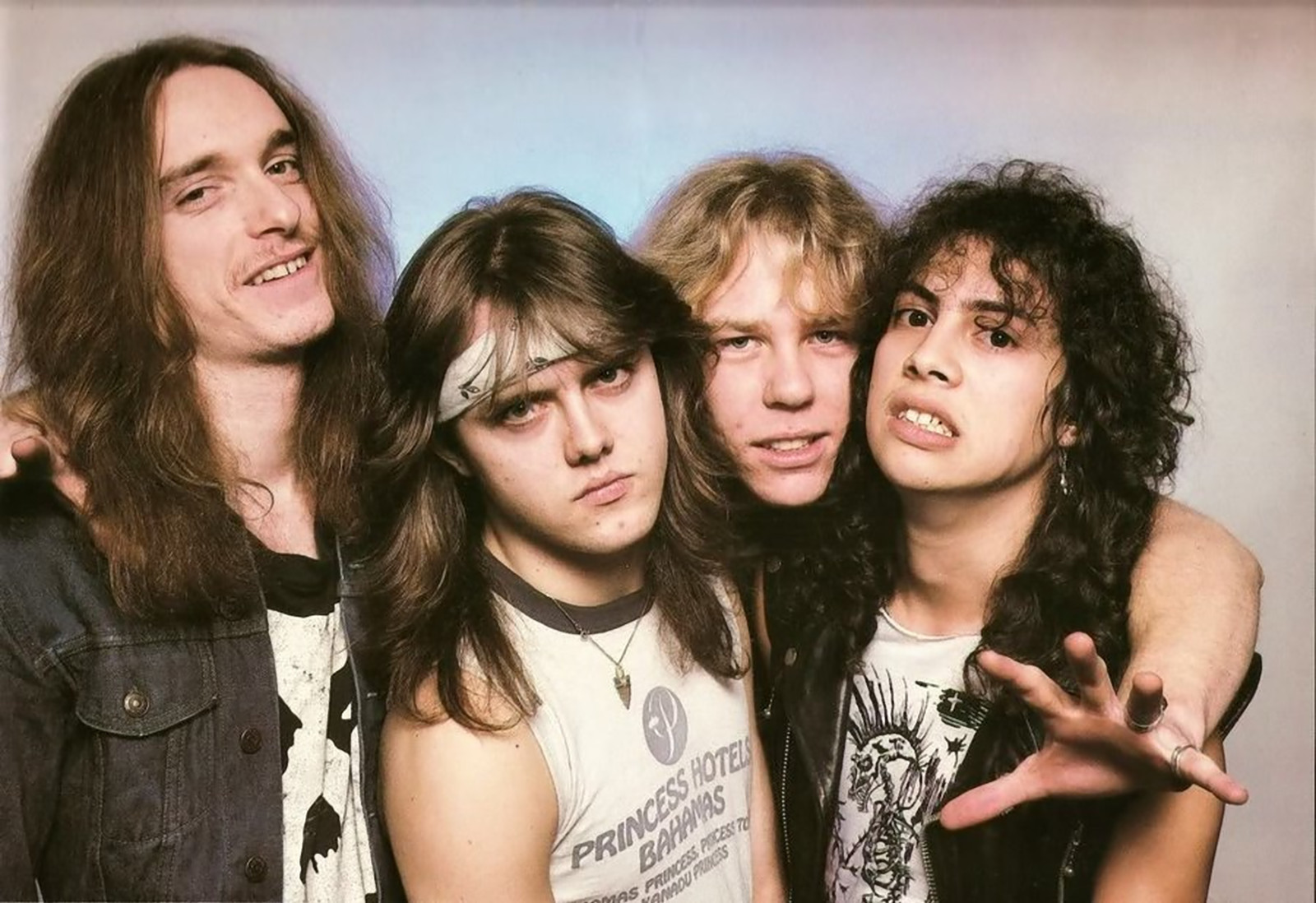 5. Metallica – Master of Puppets
5. Metallica – Master of Puppets
(1986; Megaforce/Elektra)
While Kill ‘Em All was full of great raw ideas, and Ride the Lightning provided the blueprint for the next decade of thrash metal, Master of Puppets was the fully-formed brick-and-mortar. With intelligent, political and relevant lyrics delivered via creative melodies, the songwriting stands up against anything in Paul Simon’s or Bob Dylan’s catalog. “Battery” deceives with its acoustic beginning before launching into the heaviest and fastest stuff Metallica ever wrote. “Master of Puppets” is a prime example of how seemingly unrelated riffs can be put together in one seamless (and flawless) track. You don’t even realize how long the songs are (three surpass the eight-minute mark) — not a second of any is wasted. The middle of “Orion,” the instrumental, shows a level of compositional excellence that could not have been accidental. The subject matter is as relevant then as it is now: drugs, religion, government, our own teetering sanity; we must learn how to deal with what seeks to control us. Play it in 1986, play it in 2014, and the feeling and reaction are the same. Whether you like what Metallica has done in the last 20 years or not, Master of Puppets remains an indispensable piece of metal history. – Chad Gorn
 photo by Candice Eley
photo by Candice Eley
4. Converge – Jane Doe
(2001; Equal Vision)
Consistency is a nice trait when it comes to an enduring metal career, though it’s obviously not necessary. Making a half dozen awful records in a row hasn’t prevented Metallica from collecting a check, and on the other end of the spectrum, more metal bands than we can name broke up or disappeared before even releasing a second album — the more “kvlt,” the less visible, one would assume. But then there are bands like Converge, who, after a handful of noisy, if more conventional hardcore records in the 1990s, have essentially been the model for how to maintain a consistently interesting metal career in hardcore and metal, their 2012 album All We Love We Leave Behind their fifth album in a row to prove nobody does artful, abrasive and emotionally charged hardcore better than this Salem, Mass. quartet.
That streak began with their best album, and — according to this list — the best metal album of the ’00s, 2001’s Jane Doe. Where the band had before been an unstoppable force of intense, brief bursts of abrasive riffs and menacing hardcore fury, Jane Doe introduced a much broader palette to the band’s outlook. As strange as it might sound to suggest this though, the band eased their listeners into it; the one-two punch of “Concubine” and “Fault and Fracture” represented a white-hot, uncompromising version of Converge that would never loosen their slack, nor dull their edge. But there’s a surprising level of nuance to Jane Doe — check the sultry groove of “Hell to Pay” or the shoegaze textures of “Phoenix in Flight” — as well as visceral and awe-inspiring power, which manifests on the hard-driving “Heaven in Her Arms,” the rhythmically complex “Thaw,” and the epic title track.
But there’s an even more unexpected source of power at the heart of Jane Doe: Real human emotion. And while neither the concept album nor the break-up album is entirely novel in heavy music, the combination of the two has never seemed so poetic or affecting. Frontman Jacob Bannon has always had a pretty harrowing scream, but here there’s a much more personal touch as he reflects on some very real pain (“You were my last great war/ You were my heaven ablaze”; “No love, no hope”; “I’ll take my love to the grave”). There are innumerable, massive innovations and creative developments that Converge implemented on Jane Doe, but one stands above the rest: Vulnerability. – Jeff Terich
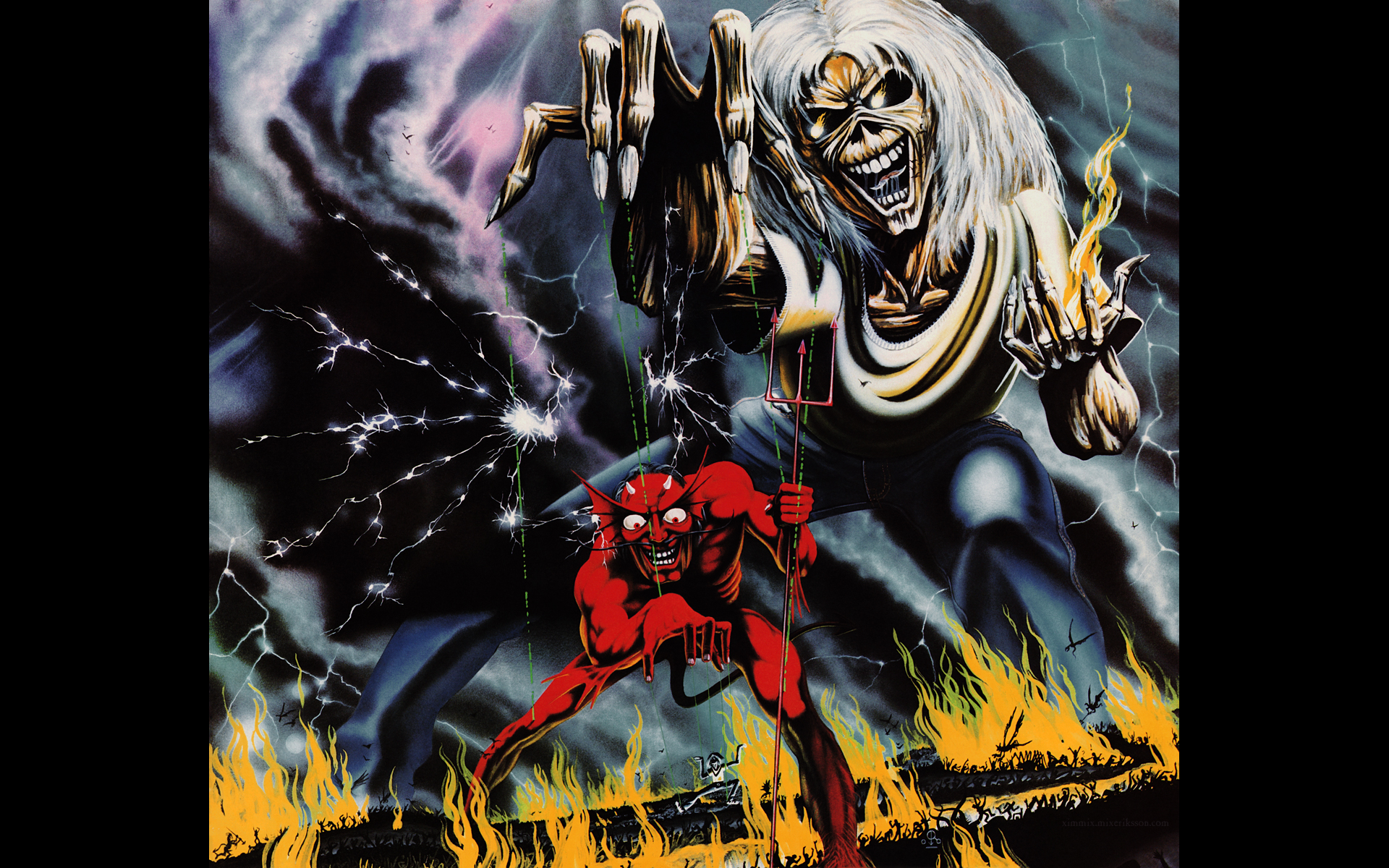 3. Iron Maiden – Number of the Beast
3. Iron Maiden – Number of the Beast
(1982; EMI)
As a popular musician, unless you’re 2 Live Crew, it’s generally a sign that you’re doing something right when extremist conservatives burn your album in the street and attempt to have it censored. However, even though the clichéd evils the riff-raff perceived in Iron Maiden’s Number of the Beast (the seeds of Satanism for American minds!) never truly existed, that doesn’t mean the record wasn’t positioned in opposition to them. Metal has always been a subversive sociopolitical phenomenon, and Maiden brought critique to the fore here, with tracks like “22 Acacia Avenue” (prostitution), “Run to the Hills” (imperialism), “Gangland” (gang warfare), and the opus “Hallowed Be Thy Name” (the death penalty) all addressing crises in American society. Credit Steve Harris for avoiding monotony and varying the subject matter around this thematic core (cf. the hallucinatory classic “The Number of the Beast”), and credit the arrival of Bruce Dickinson for elevating the band’s sound to its prime by virtue of his shockingly prodigious vocal capability (rivaled primarily by Rob Halford). Without the coalescence of this lineup and the breakthrough of this album, heavy metal would be in a different place today. And I’m willing to be that it would be worse off. – Connor Brown
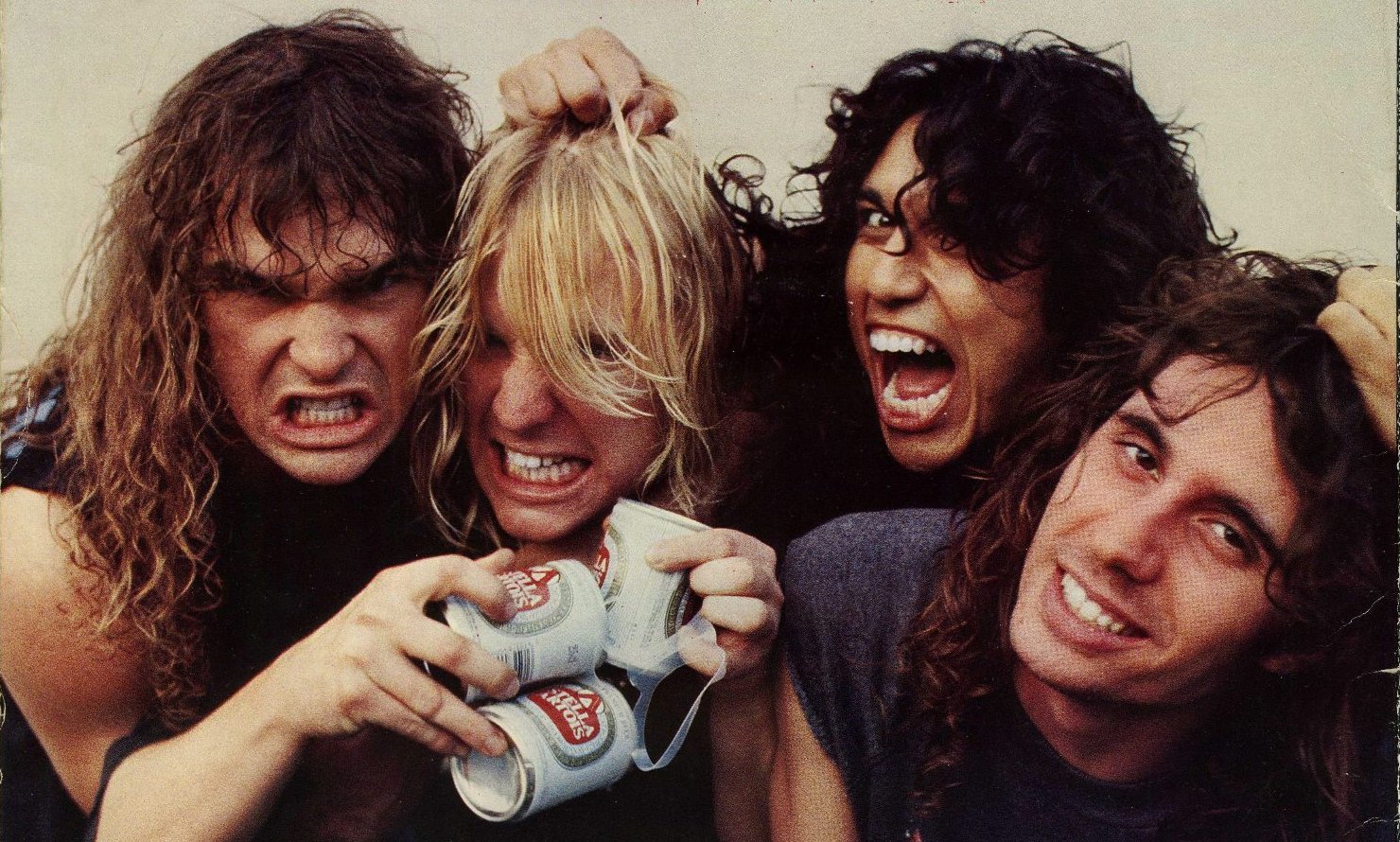 2. Slayer – Reign In Blood
2. Slayer – Reign In Blood
(1986; American)
How does one inexperienced in the ways of metal explain great metal, or have it explained to them? Maybe not so much by trying to describe what’s there as what isn’t there. All of this death and black and drone metal is nice, but these subgenres rest on foundations of distortion and reverb and overdubs and vocal affectation and HOLY SHIT STOP ALREADY. Sometimes you just have to settle in with a set of riffs and lyrics that are crystal clear, right? I mean, don’t you want to know what you’re banging your damn head to? And really, who’s gonna know you’re metal if they can’t tell how metal you are, or what you’re metal about? So I can totally see why people who know who’s metal and what’s metal point to Reign in Blood as absolutely fucking metal, man.
Every guitar arpeggio and laser-guided solo from Kerry King and Jeff Hanneman, every insane double-time Dave Lombardo rhythm, every Tom Araya lyric leading to a cathartic, emphatic scream—all are impossibly focused and sharp here, like microscopic scans of samurai swords. Other than the storm sound effects opening and closing the classic finale “Raining Blood,” you can thank Rick Rubin’s Def Jam hip-hop ass for the lack of obvious bullshit production to construct or obscure the music at the heart of each composition. (Oh yeah, and as Public Enemy’s “She Watch Channel Zero” proved, wax wasn’t just for Anthrax.) We can hear and understand just about every detail of what’s going on here, from beginning to end, in order to more easily experience and share in the nightmare.
The cannibalism tale “Piece by Piece” finds Araya’s vocals going toe to toe with James Hetfield of the day, holding onto his yell-chants by the thinnest of threads. (Jesus, this album and Metallica’s Master of Puppets in 1986? That was one hell of a year.) The shifts in tone and tempo in tracks like “Postmortem” and the Josef Mengele bio “Angel of Death” help set scenes in the same manner as opera, musical theater, and jazz. The band also proved they could get right to the point in the most punk-as-fuck manner. Frankly, I find my favorite songs on Reign in Blood include two of the shortest, “Epidemic” and the death penalty track “Necrophobic.” When Araya and company switch gears at the very end of that song—“Scared! To! Die!”—they’re not just telling the tale of some fictional prisoner. Right there, Slayer distill the album-length feeling that they’re playing for their very lives. Such power makes Reign in Blood as good a starting point as any to portray the messed-up nature of metal’s themes and the bizarre beauty and skill found in its sounds. – Adam Blyweiss
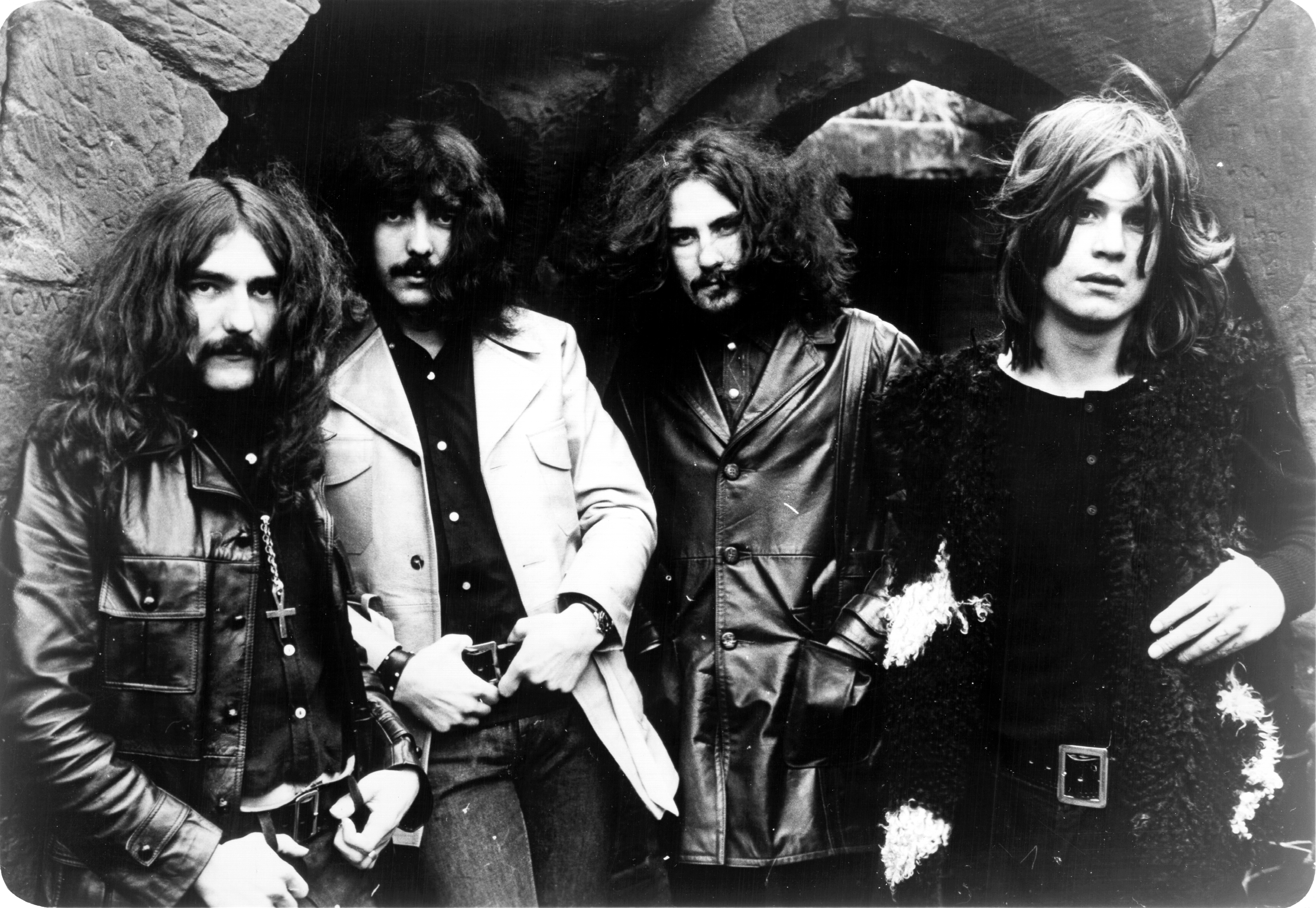 1. Black Sabbath – Paranoid
1. Black Sabbath – Paranoid
(1970; Vertigo)
It’s not the first heavy metal record ever unleashed upon an unwitting, unprepared public — but it’s pretty damn close. When Black Sabbath emerged out of Birmingham in 1970, and cast a dark pall over their audience, they pioneered a style of music we now know as doom metal. It sounded dark and dingy, and on their eponymous track, kind of terrifying as well. Here was a band with an aesthetic that came across a bit macabre, a little bit ghoulish, but resulted in one of the most ass kicking rock ‘n’ roll debuts of a then-young 1970s. That same year, they outdid themselves with an album that not only improved upon the sounds of their groundbreaking debut, but actually represents an ideal: the perfect classic heavy metal album.
Paranoid isn’t quite as murky as its predecessor — it punches harder, it booms louder, and comprises a collection of phenomenal standalone anthems (save for maybe “Rat Salad,” but the odd, fun instrumental works just fine regardless). The band stirs up a sense of drama and bombast with opening track “War Pigs,” which might be their best song. But then again, it might also be the much shorter, more direct title track, which sits somewhere between psychedelic rock and punk, which is pretty much heavy metal when you think about it. There’s trippy balladry on “Planet Caravan,” earworm menace on “Iron Man,” and squealing riff frenzy on “Electric Funeral.” These are some of the greatest songs the band ever written, and that there’s a surprising level of diversity only drives home how quickly they progressed.
There’s room for argument about whether or not Paranoid is the absolute greatest metal album of all time, but not really that much room. This is the band that invented, perfected, and reigned over heavy metal before anyone even came close to entering the kingdom. In their classic lineup, Black Sabbath were one of the greatest bands to walk the earth, from Tony Iommi’s fuzz-heavy riffs to Ozzy Osbourne’s dark prophecies, and from Geezer Butler’s thudding low-end to Bill Ward’s nimble, even surprisingly jazzy drum work. As heavy metal is concerned, Black Sabbath is The Beatles and The Stones, and Zeppelin and Floyd, and God and Satan and heaven and earth. This is their (un)holy word and testament — as heavy and massive today as it was when it was written. – Jeff Terich


Immortal? Obituary? Cannibal Corpse? Testament? Exodus? Autopsy? Asphyx? Overkill?
Ryan, Treblezine have asked me to apologize on their behalf for this misunderstanding. It appears that you are operating under the ludicrous assumption that the staff at Treble got together to compile a list of “Ryan’s favourite 100 albums”. A simple glance at the title of this article should alleviate any confusion.
What the fuck difference does it make to you, Shutupryan? Are you a staff writer at Treble? Holy shit that would be pathetic.
Shutupryan isn’t a staff writer.
Now let’s keep it civil.
They just seem a little weird.
I mean this isn’t my list or anything but 2 baroness albums?
like 9 sabbath records?
should’ve had some burzum on there, some maudlin of the well, and you know, not throw out the same names every 3 pages.
There’s only three Sabbath albums. We didn’t include Burzum, but Varg is on the Mayhem and Darkthrone albums. We figured that was plenty.
Although of course I don’t agree with everything on the list, this is the best list of metal albums I’ve been able to find on the internet. There’s a good variety of music, the albums descriptions actually seem relatively intelligent and coherent, and the same bands don’t repeat over and over. Also it isn’t filled with bands like Guns n Roses and Led Zeppelin(I like these bands but they aren’t metal). Good list guys!
I love this kind of lists, because they a) expose me to cool music I might miss otherwise and b) it’s insanely fun to tear them up.
As Top Metal albums lists go, this one is both extremely sincere (it clearly states it’s mostly about this site’s staff taste) and utterly worthless as an historical document because of it’s many systemic bias issues I’ll adress next, coming from the mind of a 42 year old metalhead with over three decades of enjoying heavy metal under his belt:
a) This list slants way too much towards bands from the US and completely ignores important bands from all over the world. A good example is Kreator’s absence: Pleasure to Kill was as influential on what would eventually become extreme metal as Reign in Blood was. ?
b) The list also slants way too much towards 00s bands that still have to prove their influence an importance. I have no issue with Harvey Milk being in this list, but do they really deserve two entries? Same goes for Baroness, Converge, Mastodon, Isis, Agalloch and Deftones, they may be great bands, but you can’t seriously equate their impact or legacy with bands like Maiden, Judas, Slayer or Metallica.
c) There’s way too much slant towards extreme metal. I get it, a lot of what was perceived as metal in the 70s and 80s was downgraded to hard rock in the early 00s, but still, bands like Deep Purple, Scorpions, AC/DC, Van Halen, Guns ‘n Roses, Rainbow and Mötley Crüe, which had a huge role on heavy metal’s formative years should be included.
d) As a consequence of a) and c) this list has no prog or power metal, two genres that have a huge audience worldwide (Dream Theatre sells out arenas worldwide, and Helloween, outside the US is a festival headliner). Also, there’s no symphonic metal, and gothic metal’s contribution is reduced to a single Type O Negative album!
e) Finally, a detail that really, really bothers me is A Vulgar Display of Power’s placement. Really, impact and influence wise, that album deserves a place in any Metal Top Ten, much more than Converge, or Botch, Baroness, Defheaven and Agalloch, bands that have albums included in this top 20.
That was fun!
Now to get myself some Harvey Milk… 🙂
Ha, glad you enjoyed that. All fair points; I think there’s no way we could possibly encompass the entire history of metal in 100 albums, and we definitely debated over whether to include bands like Deep Purple or AC/DC, ultimately deciding they were more “proto-metal.” In any case, happy to provide fuel for debate.
Well, if you take “metal leaning hard rock” as “proto-metal” a lot of your choices make a lot of sense.
I really enjoyed this list, and I’m gonna check both Ken Mode and Harvey Milk, two bands I’ve never heard before.
That, IMO, is the real purpose these lists serve: to give everyone ideas of great music to check out.
Cheers. 🙂
Yupp one of the best top 100 list i’ve seen.
Lots of Swedish albums huh?
Nice list.
Some little points of crit:
# ND’s scum deserves no spot in the top 10…
# Pig Destroyer twice in the Top 100??
Never thought of Harvey Milk as a metal band – more of an experimental rock band to my ears. Obituary’s “Slowly We Rot” is a cornerstone death metal album, and where are Fear Factory?
you really chose aenema over lateralus?
Well you got the top 3 right. Have to give you credit there. After that there are some questionable choices.
Nice job on: Coroner, Mayhem, Diamond Head, Bathory, Voivod.
Right band but wrong album(s): Sepultura (Morbid Visions or Beneath the Remains over Chaos A.D.), Atheist (Piece of Time over Unquestionable Presence), Napalm Death (From Enslavement over Scum),
Not metal: Alice in Chains, Nine Inch Nails, Soundgarden, Bad Brains (great band though), Deftones, Korn. Plus some others that I don’t know but don’t seem like metal bands to me. You could fit so many worthy records on the list if you jus left these off.
There are much better choices than: Mastedon, Tool, Botch, Helmet, Boris, Rage Against the Machine, System of a Down, Deftones.
You forgot: Obituary, Autopsy, Cadaver, King Diamond, Destruction, Sadus, Def Leppard (High n Dry), Candlemass, Pestilence, Burzum, Fates Warning, Ozzy (Diary), Exodus (Bonded by Blood), Queensryche (Operation Mindcrime), Saint Vitus.
I forget was Stained Class on the list?
Pantera flat out sucks. Same with Rage Against the Machine. Awful crappy bands. Not in the top 1,000 metal albums.
Paranoid at #1 is a definite. No doubt there.
While I agree that NIN is not typically a metal band, Broken is the exception. Definitely a metal album
Someone will have to explain the love for Converge. I just don’t get it. Anyone who puts Jane Doe ahead of Master of Puppets just lost a lot of credibility in my eyes.
Without a doubt one of the worst list’s I’ve ever seen. While you have a buncha great stuff and the top 3 right (but still barely, it is a cop out top 3), there are countless bands that are not metal and for the ones that dance on the metal/rock/core barriers, you picked the wrong albums.
I like this list, it’s eclectic and open minded with some outstanding albums. Do I agree with the order or everything on it? Nope. But wouldn’t it be really dumb if we all shared the absolute same tastes?
I’m highly suspicious of Deafhaven’s hipster haircuts though, but that’s probably because I’m getting old, I’m sure I’d love Deafhaven if I was 15 year old.
This is probably the best list I’ve seen so far. Open-minded enough to annoy elitists and those with incredibly narrow genre definitions (you’re looking at a genre Led Zeppelin and Deep Purple were once included in…are Harvey Milk and Soundgarden really such a stretch?) but still sticks to quality albums. I’m not so sure about the order (Paranoid isn’t even my favorite Black Sabbath album), and my list would have a bunch more black metal (I’m a black metal nut), but the selections are good overall.
Albums that deserve to be added IMO:
Karp – Self Titled LP
Don Caballero – Don Caballero 2
Mgła – Exercises in Futility
What a list you can come up with just by looking up Wikipedia, Did you actually listen to anyone of these? Believe me you don’t know the whole story..
Great list! Certainly much better than Rolling Stone’s garbage list, although everything RS does sucks dick. Obviously, no one is going to agree on all your choices, so here’s a few albums I’d put on my personal list:
Soundgarden- Superunknown
Alice In Chains- Self Titled
Shai Hulud- Hearts Once Nourished With Hope And Compassion
Tad- Inhaler
The Melvins- Gluey Porch Treatments
Venom- Welcome To Hell
Faith No More- The Real Thing
Faith No More- Angel Dust
Living Colour- Vivid
Acid King- Busse Woods
Earth Crisis- Destroy The Machines
Gruntruck- Push
Anal Cunt- It Just Gets Worse
Parkway Drive- Blue